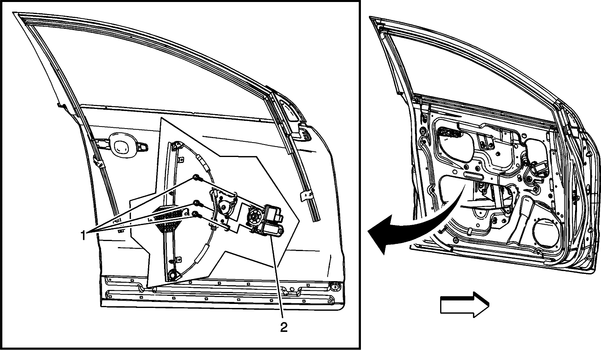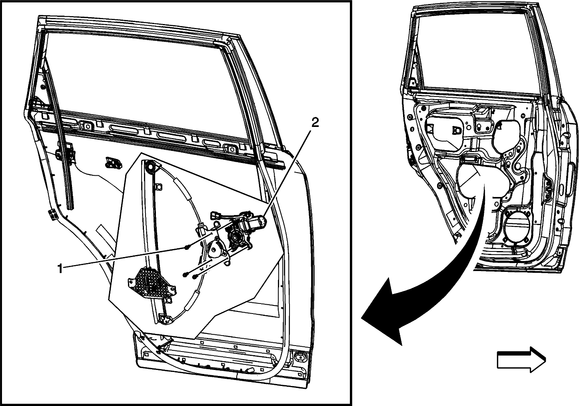Chevrolet Captiva Service & Repair Manual: Window Regulator Motor R&R
Front
| 1. |
Remove front side door window regulator,
Fig. 1. |
| 2. |
Remove front side door window regulator
motor screws, Fig. 1. |
| 3. |
Remove front side door window regulator
motor, Fig. 1. |
| 4. |
Reverse procedure to install. Torque
regulator motor bolts to 71 inch lbs. |
|
Rear
| 1. |
Remove rear side door window regulator. |
| 2. |
Remove rear side door window regulator
motor screws, Fig. 2. |
| 3. |
Remove rear side door window regulator
motor, Fig. 2. |
| 4. |
Reverse procedure to install. Torque
regulator motor bolts to 71 inch lbs. |
|

Fig.
1

Fig.
2
To remove and install the window regulator motor in a Chevrolet Captiva, you'll want to begin by preparing the vehicle. Park it on a level surface, engage the parking brake, and disconnect the negative terminal of the battery to prevent any electrical mishaps during the process. Once you've taken these precautions, you can move on to the actual removal steps.
After removing it's time to install the new window regulator motor. Position the new motor in place on the regulator assembly and secure it with the appropriate mounting bolts or screws. Reconnect the electrical connector to the new motor. Before reassembling everything, it's crucial to test the operation of the new motor. Reconnect the negative battery terminal and test the window by operating the window switch. Ensure that the window moves smoothly and correctly with the new motor. If everything is working as expected, reassemble the door panel, making sure to secure it back in place with the necessary screws or bolts.
Procedure
1.
Disconnect electrical connection.
2.
Rotate stop lamp switch counterclockwise
to remove it from pedal assembly, Fig. 1.
...
Refer to Fig. 1
for alternator replacement.
1.
Disconnect battery ground cable.
2.
Remove drive belt, as follows:
...


 Brake Light Switch R&R
Brake Light Switch R&R Alternator, Replace
Alternator, Replace